The Dell Chromebook 11 Touch Review
by Brandon Chester on May 7, 2015 8:00 AM EST- Posted in
- Laptops
- Chrome OS
- Chromebook
Web Performance
Due to the limitations of Chrome OS, we're mostly limited to browser benchmarks to characterize performance. It's a similar situation to mobile benchmarking, which I commonly describe as less than optimal. However, since essentially everything a user will do on a Chrome OS device is done through Chrome, it's actually a fairly good indication of the performance they'll see on a given device.
Like the Toshiba Chromebook 2, the Dell Chromebook 11 being reviewed uses Intel's Celeron N2840. Unlike Intel's more expensive Celeron parts which use their Haswell architecture, N2840 uses Silvermont cores much like Intel's Atom parts in the Bay Trail line. Because of this, users should expect performance closer to that of higher end ARM chips and Intel Atom SoCs than that of Intel's Haswell based Celeron parts.
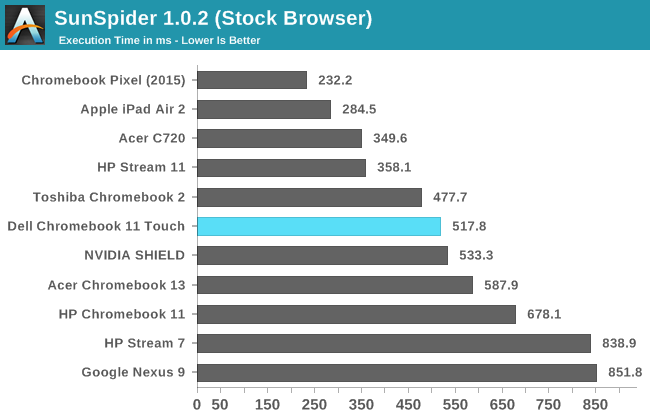
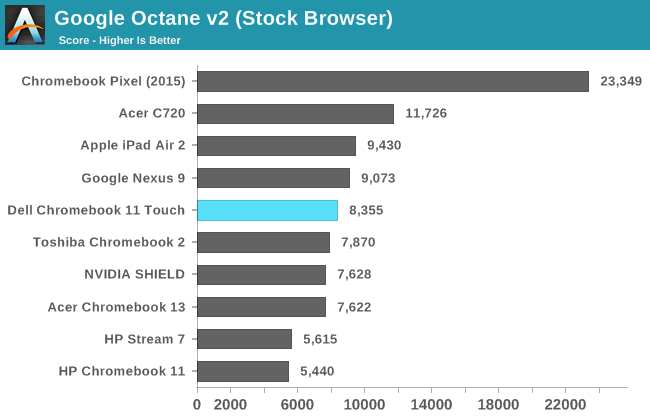
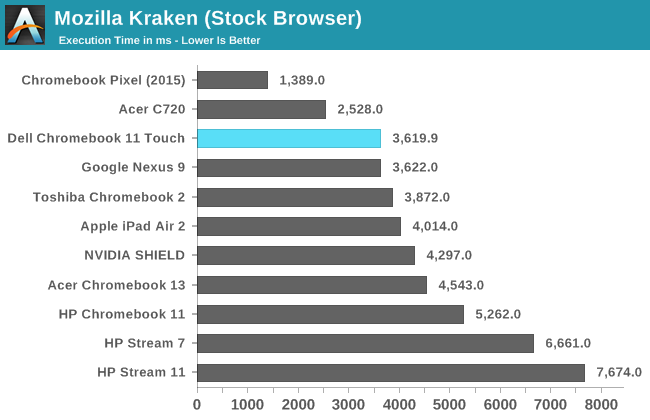
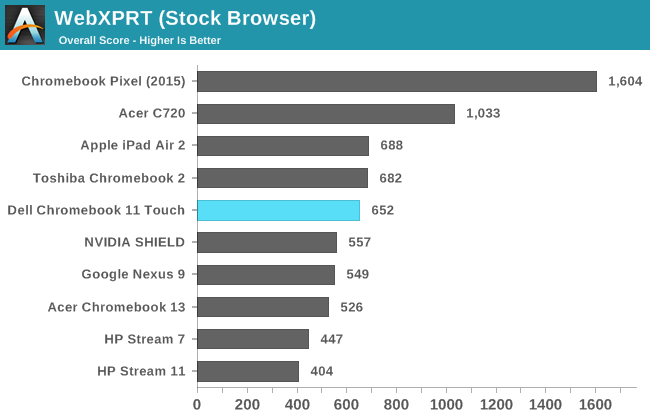
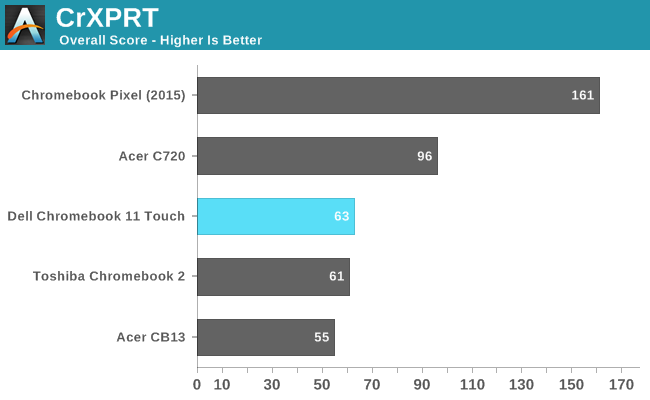
In all of our benchmarks, the Dell Chromebook 11 gets roughly the same results as the Toshiba Chromebook 2. There are some minor differences which can be attributed to variance in scores between tests, as well as updates that have been made to Chrome OS since previous reviews. When using the Dell Chromebook 11 it never seemed to struggle, and I think that users will have all the speed they need to do their work on the web even if the CPU doesn't offer class leading performance.
WiFi Performance
Since Chromebooks are devices that are primarily used to browse the web, it's important to have good WiFi performance. Most inexpensive Chromebooks opt for 802.11n, and sometimes don't even include support for the 5GHz band. Because the Dell Chromebook 11 is more of a mid range Chromebook, it includes support for dual spatial stream 802.11ac which is pretty much as good as it gets for laptop WiFi, with the exception of a few 3x3 devices that are on the market.
While there's no way to test WiFi performance in Chrome OS, it can be accomplished via other means with the use of Linux and iPerf. I'm hoping to eventually bring our laptop WiFi performance test from Windows to Linux in order to get TCP results that are comparable to those in our standard laptop reviews, but for now I've just put the Dell Chromebook 11 through the UDP performance test that we use in mobile reviews.
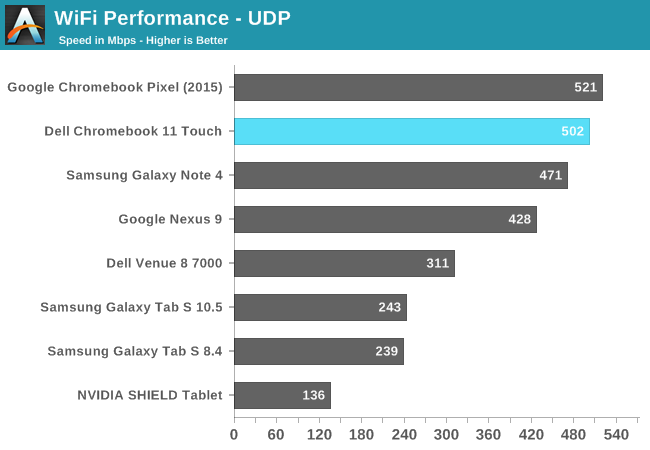
With a maximum speed of 502Mbps, the Dell Chromebook 11 is beaten only by the Chromebook Pixel. I wish I had more Chromebook data points here, but this is a test that I introduced for our Chromebook reviews and this is only my second review of one. Regardless, I don't suspect that users will have any complaints about the WiFi performance on the Dell Chromebook 11.










46 Comments
View All Comments
damianrobertjones - Thursday, May 7, 2015 - link
"16GB eMMC"...and it fails again. Like 1366x768 on a windows machine... Why? It's your money so there you go.
cjb110 - Thursday, May 7, 2015 - link
and again failure to understand what chromebooks usage is. You will not be storing any documents on it, you don't need to.Michael Bay - Thursday, May 7, 2015 - link
Please forgive him for not understanding how useless machine can be used.shing3232 - Thursday, May 7, 2015 - link
it is just a netbook.SunLord - Friday, May 8, 2015 - link
I have a Acer 720p running Linux via crouton which makes it pretty nice little laptop for $330 kick it upto $400 if you add a 128gb ssd since it's got an m2 sata port vs shitty on-board emmc. It's not super powerful but it's small light and more then enoughBackInAction - Thursday, May 7, 2015 - link
Storage is a non-issue on a Chromebook. However, the display on many (most) have poor resolution (1366x768) and horrible off-axis viewing.That said, the Toshiba 13 Chromebook is used more than any other "computer" at my home outside of smartphones.
leexgx - Friday, May 8, 2015 - link
its the 2GB option that is the problem, 4GB Chromebook will pretty much does not slow down but on 2GB (none upgradeable chromebook acer 720 that i have) it can run out even with small number of tabs open (google could learn something from Firefox as in do not Load the tabs until they are clicked on)and i would not hold to much about the hinge on this chromebook if its using the same one as the STUDIO dell laptops use (not very strong)
leexgx - Friday, May 8, 2015 - link
and to add its using a ATOM CPU (N2840) so its slower then a acer 720 (cut down i3 > 2955U) i would avoid any chromebook that has a ATOM (N cpu) or ARM based cpu in it as they are not very good at handling complex pages and the GPU has problems with 1080p60 or even just 1080p (the ARM CPUs have problems with just 720p)milkod2001 - Thursday, May 7, 2015 - link
An the winner of the ugliest and thickest 2015 laptop is: Dell Chromebook 11 Touch.Competition was very tough but Dell's Chromebook 11 Touch had edge with its storage(whooping 16GB eMMC),screen(1366x768) options and with amount of rubber...
Essence_of_War - Thursday, May 7, 2015 - link
My fiance picked up a haswell 2955U Dell chromebook 11, and we are both really happy with it, seeing as it uses the same CPU as the Acer C720, it looks like this re-design has pretty substantial drop in performance with the exception of the addition of AC wireless.